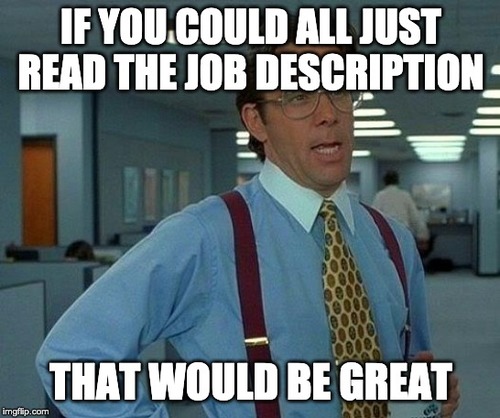Job interviews can be a very stressful experience, knowing where to go, how you're getting there, remembering who you're meeting with, and everything about the company and position.
Being prepared and doing some research in advance isn't a bad idea, here are a few tips on what to read up on before you head to your interview.
1. Just read the job description

In the age of online job boards and one-click apply the number of people who turn up at interviews entirely and utterly, unprepared has skyrocketed.
Luckily here at Employment Solutions, we make sure that our candidates are well versed on the job spec before the interview. If you don't know what the job is, then no interview for you Mr/Mrs Candidate. Simple.
But come on, this is the most straightforward bit of prep you can do and how embarrassed would you be to go to an interview and be asked; "why do you think you'd be good for this role" and have to respond "Errr I don't know, I didn't read the job spec".
Let's leave this topic here, just read the job spec and if you don't understand anything on it…. ask.
It's not hard. Rant over…. moving on.
2. What do the company do?

This one is a given right?
Not necessarily, it's insane the number of people that attend interviews without knowing what the company actually do. #Awkward. In 9 out of 10 interviews, you are going to be asked the following question.
"So what do you know about the company?"
If you can't answer this question and haven't taken the time to look over the companies website, at least, do you really think that they are going to hire you? Make sure you browse their social pages, website and do a quick google search on any projects that they have ongoing.
If you're working with a recruiter, they should be able to brief you on the company inside out, and they aren't going to be upset that you've asked them for advice.
3. Know the Companies Mission

A companies mission tells you why they do what they do; why they exist and their values. Take Tesla for example; Their mission statement says "To accelerate the world's transition to sustainable energy".
You'll usually find this on the companies website although it might not be on the home page, try pages like; about us, our mission or our values. Use what you find in your search to tie in your values with the companies to show how well they match.
4. Get a feel for the companies culture

This can be a tricky one. If you haven't been on-site, spoken to any staff or don't know anyone that works their already. You can get a bit of an idea of the companies culture by how they want to be seen by the public.
Social media is your friend for this one!
Check out their facebook, LinkedIn, Twitter, Glassdoor and Instagram pages; yes, most companies have these now. They usually use these to show off employee engagement in the office and company events. Do they come across as consummately professional? Are they a bit off the wall? Or maybe they give off a super casual vibe?
Once you have found out about the company culture, make sure it's for you and then all you have to do is come across as someone who would fit in well within the workplace. If you do struggle to find anything out about a companies culture, ask them! It won't hurt your chances, in fact, it might help.
5. "Read all about it" In the news!

Going the extra mile with your research and looking further afield than just the company website and socials, and looking at news articles, blogs and industry publications, could potentially earn you massive brownie points with your interviewer.
being able to actually go back and forth with the interviewer on the companies recent successes and showing actual knowledge of how the company is performing all show how interested you are in working for them.
DONT, however, bring up any bad press they may have had…. but you knew that already.
6. History Lessons

This level of research is a lot more complicated than the previous ones we have mentioned, find out as much as you can about the companies history! Have they recently been bought out? Do they have a new MD? Have they gone through a recent spurt of growth?
Having facts about the company in your interview arsenal will help you have better conversations with your interviewer and will show that you have taken your time to do your homework.
7. Who is the competition?

You will be asked "who do you think are our major competitors?" in most interviews. Unless you've done your research, it's going to be a tough one to answer, especially if its a new industry. A strong answer to this question, with a few correct answers, will land very well with your interviewer.
8. What's the (Universal Selling) Point?

This is the equivalent to an interview grand slam. If you know who the main competition is, you can try and work out the companies universal selling point.
What makes them different from the competition? How do they compete?
Knowing this will show off your commercial acumen and that you are genuinely interested in the company!
9. Who's in charge?

Although this is not the most essential thing listed, doing some research on the companies managers and management structure can help you in an interview.
Knowing facts about the management can come across as very impressive.. but don't overdo it. For example, the Businesses owner won a specific industry award or was featured in an industry magazine, these are great ones to drop in.
At the very very very least find out who is interviewing you and who your potential line manager would be and get an insight into their background. No not how many kids they have or the name of the cat, but things like University attended can be a good conversation starter.
Find common ground, and you'll get off to a great start.
10. Final thoughts

There is a ton of other things that you should also be looking at before interview, making sure you know about the industry, READ THE JOB SPEC and anything else that might be relevant in your mind.
Don't go unprepared, it's definitely a waste of everyone's time.
It's in your own interest to do all of this well as it could be the difference between you getting or not getting the job!
.png)







